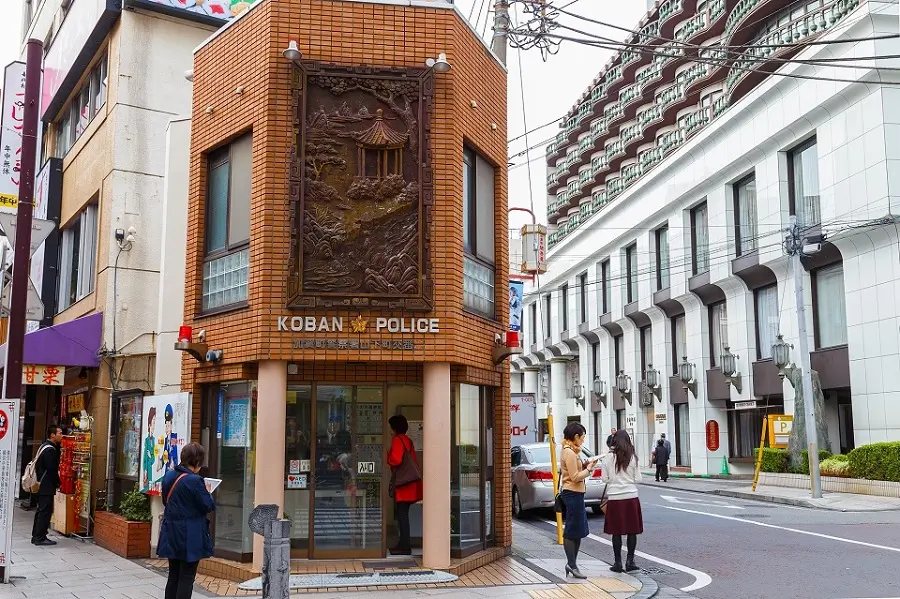Lost & Found in Japan: How to Find Lost Items

In Japan, “Lost & Found” can be termed as “Lost IS Found.” The reason is that if you lose something in Japan, there is very little probability that you will not find it. However, as a foreigner, knowing what you should do if you lose anything in Japan is important.
The dreadful moment when you realize you’re no longer carrying a bag you once had or that your phone or wallet is no longer in your pocket. We’ve all experienced this unforgettable horror at one time or another!
Thankfully, due to the Japanese culture and discipline of society, the chance of you getting back a lost item in Japan is surprisingly high. So, don’t panic just yet! Calm down, read this lost and found guide for Japan, and see if you can find what you’ve lost.
Lost Item Vocabulary in Japanese:
Before we discuss ways to find your lost items in Japan, let us check some Japanese words and terms related to Lost and found and also for items we commonly lose. These Japanese words will come in very handy for you to be able to communicate with the staff at various lost & found centers, police stations, and public transport facilities:
- Lost item = Wasuremono (忘れ物)
- Lost and Found Center = Ishitsubutsu sentā (遺失物センター)
- Police station = Keisatsusho (警察署)
- Small local police station = Koban (交番)
- Contents = Naiyo butsu (内容物)
- Wallet/purse = Saifu (財布)
- Bag = Kaban (かばん)
- Smartphone = Sumātofon (スマートフォン)
- Key = Kagi (鍵)
- Ring = Yubiwa (指輪)
- Ticket = Kippu (切符)
- Laptop = Pasokon (パソコン)
- Book = Hon (本)
Where Did You Last Have It?
The first question you must ask yourself is: “Where did I last have it”? Figuring this out is the key to retrieving lost items. Once you have an idea, trace your steps to that location and follow the guide below.
Also, fundamental Japanese language skills will go a long way to successfully finding a lost item in Japan. If you can’t communicate in Japanese, try to find someone who can.
Losing Items at Train Stations in Japan
If you’ve lost something at a particular train station, head to that station and ask a staff member if they have your ‘wasuremono‘.
You must tell the railway staff about the item by describing it in as much detail as possible. A detailed description is required for them to identify the item and prove it’s yours.
If you lost it on the same day, they’ll likely still have it on hand. However, if it’s been longer than a day, they may have given it to their central lost and found center. If this is the case, they’ll tell you which station you need to go to pick it up.
Finding Items Lost in a Train
Consider yourself very lucky if you lose an item on a train. If you lose an item at other public places, the person who finds it must take it to the police or any staff of the public facility. However, if you lose an item on a train, you do not need to take the item to the train staff.
Once the train reaches its final destination, the railway employees thoroughly check all the compartments to see if the passengers have left any items. This practice is also followed in subways and other local trains.
If you’ve forgotten something on the train, try writing down as many details about the ride as possible. These details include the train line, time, departing station, disembarking station, and your seat/carriage number, if possible. All such information is printed on the ticket if you buy a ticket for a certain train and reserve a seat. If it was a regular train without a ticket, try to recall the stations, time, and general area where you sat (front, middle, back).
Once this is in order, head to either the station you boarded from or the one you got off at. Technically, it should be possible to visit any station on the same line, as they will all likely be a part of the same company. However, don’t just visit a random station, as it may be under completely different management.
Railway Helpline for Lost & Found
Many train companies will also have a designated lost and found line to call with some English services available. If you are confident about making a phone call, try searching for the train company’s number or website online. Companies like JR East and JR Central have lost and found English services, so you don’t need to stress about speaking Japanese!
As with the above, talk to a station staff member and provide them with as much information as possible.
If you realize immediately after disembarking that your item might still be on the train, the staff will try to retrieve it at the last stop.
However, if you realize you lost the item later, it will be kept at a lost and found center or a police station.
If you’ve moved to an entirely different region of Japan and can’t return, you may be able to have the item sent to you via post. However, you may need to pay for the postage on delivery.
Finding Items Lost in a Taxi
Similar to trains, taxi drivers also check their taxis for forgotten items. However, unlike trains, where you can simply contact the railway station, taxis pose a bit of a challenge, especially if you are not careful to keep the receipt to know the particular taxi company’s phone number.
The taxi fare receipt has the taxi company’s contact information, the taxi number, the time of the ride, and the receipt number. If you have the receipt, this is all the information you need to retrieve your lost item. However, the most important information you need is the taxi company’s phone number and the receipt number.
Call the taxi company (generally Japanese only) and provide the above information and the details of the item you forgot in the taxi.
If the taxi driver hasn’t yet delivered the item to their headquarters or additional confirmation is required, the company may ask for your number so they can call back later.
Things will become significantly more complicated if you don’t have a receipt. Like some other countries, Japan doesn’t have a centralized taxi system but a wide variety of companies that rarely communicate.
But don’t worry; hope is not all lost! Try to recall and write down all the details of your taxi. These details may include the taxi’s color, shape, style, roof light, and the time and area of your ride. Enter this information online in Japanese and see if the taxi company you used appears.
What to Do if You Do Not Have the Taxi Receipt?
However, if you do not find the details of the taxi company, check an online map to reveal the nearest taxi centers to the area and call each one. If none of this works, then your only remaining option is to visit the police.
How Long Does Taxi Company Hold the Lost Items?
Taxi centers will generally keep lost items for up to a week before handing them to the police. So, there’s still a chance of getting them back even if you realize you lost the item after over a week. However, in such a case, you should call the taxi company to get details of the police station where they return the items.
Finding Items in Lost in Buses
Getting any forgotten items on a Japanese bus is easier than a taxi. This is because a specific bus company in Japan covers a specific bus route.
As with the above, collect as much information about the bus ride as possible. This includes the route, time, seating location, and your ticket or booking information if it was an express or privately operated bus service.
Unlike trains and taxis, the municipal government operates most local buses centrally. Find the closest bus center and call or visit them. You must tell them the above information along with the details of the lost item. However, do not worry if you can’t recall many details about the ride. If you do not recall all the details about the ride, conveying details about the lost item will suffice.
If a private company ran the bus, call their office instead. Some municipalities and bus companies will also have a website with a designated lost property form.
Finding an Item Lost on the Street

If you’ve simply dropped something on the street, head straight for the nearest police station or koban (small police office). Tell them the details and exact location to the best of your ability, and they will either give you the item after asking some follow-up questions. If they do not have the item or information, they will call around to see if it’s been handed in elsewhere.
Getting back a lost item on a busy street can be challenging, especially if the item is not valuable. If you lose a valuable item, you can rest assured that someone will pick it up and take it to the police. However, people may not like to take the pains of carrying an item to the police if they find it not valuable.
Finding a Lost Item at a Commercial Establishment

If you have lost an item at a bar, nightclub, shop, restaurant, or any expo, etc., return to the establishment where you lost your item and talk to the staff. Again, describe the item in detail and when/where you lost it, and they’ll confirm if there are any lost items in the staff room. If they don’t have it, head to the police station.
You’ve Found Your Lost Item!
There’s nothing more relieving than getting back something you’ve lost! If you’re lucky enough to experience this in Japan, thank everyone who helped you. You may also receive the contact details of the individual who turned it in, so you should try to give them a call even if you don’t speak Japanese.
Technically, in Japan, the finder of a lost item is entitled to a reward of “not less than 5% and no more than 20% of the returned property’s value” (Lost Property Law Section 8 Paragraph 1).
In fact, the police may even give your details to the finder to arrange this, so do be wary. Despite this, many are happy with just your gratitude and won’t demand anything, so it’s still worthwhile contacting them.
If they ask for a reward, remember that they went out of their way to help you, so showing appreciation in cash isn’t always bad. However, a situation where a person asks for a reward is just theoretical. Practically, people DO NOT ask for any reward.
However, if you don’t claim your item within three months, it will automatically become the finder’s property, except items with personal information like phones, IDs, laptops, etc.
Lost & Found in Tokyo: Helpful Resources
Following are some of the useful guides, contract numbers, and links if you have lost an item at any of the following facilities in Tokyo:
Lost Items at Narita Airport
- Narita Airport Lost & Found Guide: https://www.narita-airport.jp/en/faq/lost/
- Terminal 1 Lost & Found phone number: +81 476-32-2105
- Terminal 2 Lost & Found phone number: +81 476-34-5220
- Terminal 3 Lost & Found phone number: +81 476-34-4195
Lost Items at Haneda Airport
- Haneda Airport Lost & Found Guide: https://tokyo-haneda.com/en/lost/index.html
- Terminal 1 Lost & Found phone number: +81 3-5757-8111
- Terminal 2 Lost & Found phone number: +81 3-5757-8111
- Terminal 3 Lost & Found phone number: +81 50-5533-6931
Lost Items in Airport Limousine Bus
Tokyo Limousine Bus Lost & Found Help: https://www.limousinebus.co.jp/en/support/lost/
Lost Items in JR Train or JR Station
Tokyo JR Lost & Found Help: https://global.jr-central.co.jp/en/lost-and-found/
Lost Items in Tokyo Metro or Metro Station
Tokyo Metro Lost & Found Help: https://www.tokyometro.jp/en/faq_lost/index.html
Conclusion
Though you will generally not find people who have lost valuables and did not get them back, you should not ignore that possibility. Unfortunately, this is just a part of life.
Not finding the item will depend on various factors. Japanese people will always carry any lost items they find to the police or staff of the facilities; however, there is always a chance that your item is found by a rare person who does not follow cultural discipline. Moreover, we can’t deny the possibility that a bad tourist found your lost item.
It is not just the above points; you may be unable to recall the required details about the item or where you lost it. There can always be a situation in which you fail to get back what you lost. The following are a few final tips for you to avoid missing item blues.
Final Tips about Lost and Found in Japan
- Always check your seat and surroundings before exiting a train, taxi, or bus.
- Never decline the receipt for your taxi fare containing your ride details.
- Do not throw away the receipts for items and taxis you take.
- Make it a practice to observe the compartment number of subways and metro you ride.
- Remember the main contents of your bag.
- Remember the brand name and other details of your valuable content.
Last but not least, human behavior and the discipline of any society are like a chain reaction. We witness people following good practices, and we feel it is our moral obligation to follow the same suit.
However, if we see people not following good practices, we may do the same. It is like a pedestrian crossing at a traffic light. For example, if there is no traffic and a pedestrian starts crossing the street when the light is still red, more people tend to follow and jump the red light.
Considering the above, the best way to ensure you keep getting your lost items back is by returning the good gesture. If you find a lost item in Japan, please spend a few minutes carrying it to the police station or the facility staff to help the person who lost it. Remember that ripples of good karma have a way of returning to you.

Born in Melbourne, Australia, Steven came to Japan as an English teacher and currently works as a writer in Niigata City. Bilingual with fluent Japanese language, Steven loves relishing local sake, reading anime, and traveling.
